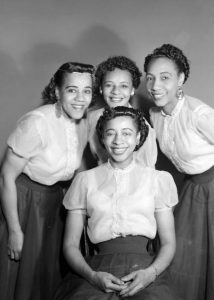
Aletra Hampton (Oct. 8, 1915 – Nov. 13, 2007);
Carmelita Hampton (Nov. 16, 1916 – May 16, 1987);
Virtue Hampton Whitted (Feb. 22, 1922 – Jan. 17, 2007);
Dawn Hampton (June 8, 1928 – Sep. 25, 2016).
Aletra, Carmalita, Virtue, and Dawn Hampton were part of the first family of Jazz–the legendary Hamptons. The Hampton sisters and their siblings were taught to play instruments at a young age by their parents, Laura Burford Hampton and Clarke Fielding (Deacon) Hampton. Deacon believed that being able to perform was the one way to always ensure an income, so he and Laura put an emphasis on their 12 children’s music training.
The sisters began performing in the 1920s with their family’s band, Deacon Hampton’s Pickaninny Band (later Deacon Hampton’s Family Band). The family traveled across the Midwest in a converted delivery truck, performing on the carnival circuit, at fairs, and for private parties. Their performances included dancing, comedy skits, and of course music including country, swing, rhythm and blues, polka, and jazz.
After a failed attempt to make it in Hollywood in the late 1930s, the Hamptons settled in Indianapolis at 529-31 West Vermont and began playing at Cotton Club and Sunset Terrace. It was not until World War II, when the family band went on hiatus after several of the brothers enlisted in the war, that the Hampton sisters began playing as a quartet.
Aletra played harp and piano; Carmalita played baritone saxophone, banjo, and guitar; Virtue played double bass; Dawn played alto saxophone. Each one of them performed vocals. Under the name, The Hamptonians, the sisters played at local clubs along Indiana Avenue and in USO shows.
Post-World War II, Duke Hampton (the oldest brother) transitioned the family band to the Duke Hampton Band, later renamed the Orchestra. The sisters joined the orchestra and toured with the band to well-known venues like the Apollo Theater, the Savoy Ballroom, and Carnegie Hall. The band also performed as the house band in several clubs in Indianapolis including Indiana Avenue’s Sunset Terrace and a North Meridian Street club that went by many names over the years (Stein’s, Nick and Jerry’s, and Jim and Hy’s).
When the family band dissolved in the 1950s, the sisters once again formed a quartet and made a name for themselves in Indianapolis. During this time, the Hampton Sisters got their first record deal. In 1954, they recorded “Hey Little Boy” and “My Heart Tells Me” for their first 78-rpm for Savoy Records.
In 1958, the quartet became a trio. A self-proclaimed diva, Dawn moved to New York City to pursue a solo career as a cabaret singer. Dubbed the “Queen of Cabaret,” she made a name for herself as a performer, singing from the 1960s through the 1980s. Dawn even mentored various up-and-coming stars like Bette Midler. Later in her career, she added dancing and jazz whistling to her repertoire.
Aletra, Carmalita, and Virtue continued as a trio for a few more years until Carmalita moved to Chicago in the early 1960s. In 1981, Carmalita returned to Indianapolis and reunited with Aletra and Virtue to once again form the Hampton Sisters trio. After Carmalita died in 1987, Aletra and Virtue continued as a jazz duo, performing around Indianapolis until the early 2000s. By the time they quit performing in 2006, Aletra was 91 years old and Virtue was 84 years old.
Throughout their long careers as jazz musicians, the Hampton Sisters received many awards and honors that attested to their legacy in Indianapolis. In 1999, Aletra and Virtue were inducted into the Indianapolis Jazz Foundation Hall of Fame. In 2003, the duo was honored with a benefit concert at the Indiana Historical Society. They received honorary doctorate of music degrees from the University of Indianapolis a year later. newspaper’s Cultural Vision Lifetime Achievement Award was presented to Aletra and Virtue in 2006.

Help improve this entry
Contribute information, offer corrections, suggest images.
You can also recommend new entries related to this topic.